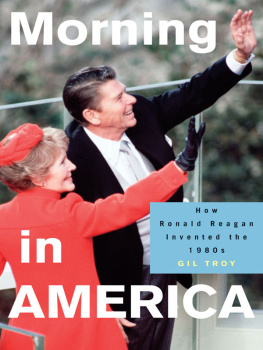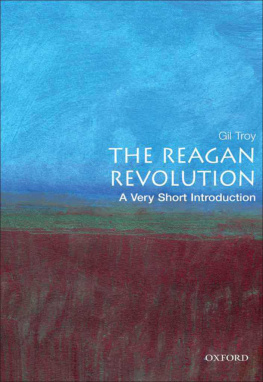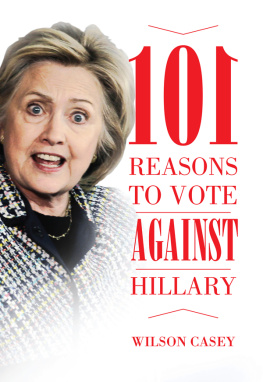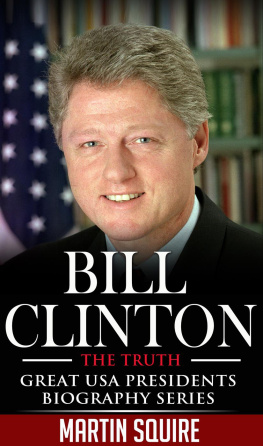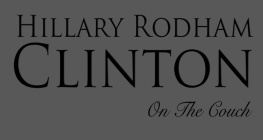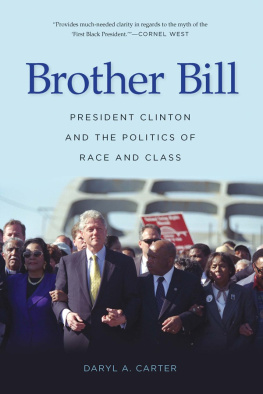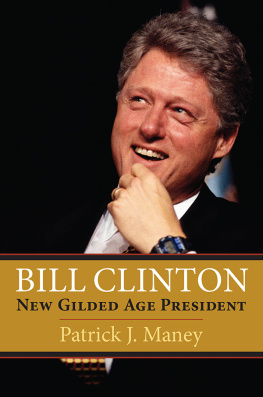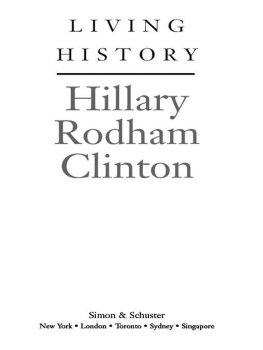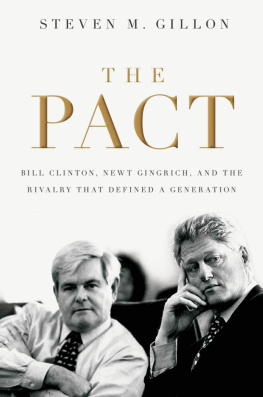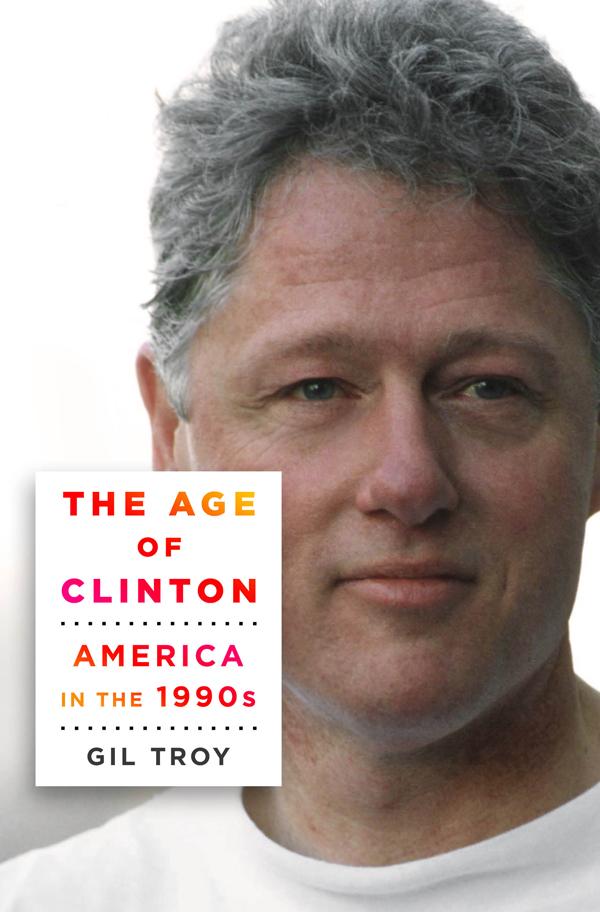Contents
Guide

The author and publisher have provided this e-book to you for your personal use only. You may not make this e-book publicly available in any way. Copyright infringement is against the law. If you believe the copy of this e-book you are reading infringes on the authors copyright, please notify the publisher at: us.macmillanusa.com/piracy.
Please note that some of the links referenced in this work are no longer active.
To Linda and the kids, the best things that happened to me in the Age of Clinton
Constant revolutionizing of production, uninterrupted disturbance of all social conditions, everlasting uncertainty, and agitation distinguish the bourgeois epoch from all earlier ones. All fixed, fast-frozen relations, with their train of ancient and venerable prejudices and opinions, are swept away, all new-formed ones become antiquated before they can ossify. All that is solid melts into air, all that is holy is profaned.
K ARL M ARX AND F RIEDRICH E NGELS, T HE C OMMUNIST M ANIFESTO, 1848
A professor named Carroll Quigley said to us that America was the greatest Nation in history because our people had always believed in two thingsthat tomorrow can be better than today and that every one of us has a personal moral responsibility to make it so.
B ILL C LINTON, NOMINATION ACCEPTANCE SPEECH , J ULY 16, 1992, N EW Y ORK
My own belief is that human beings, particularly the American people, are capable of enduring a lot of difficulty and a lot of tumult and upheaval if they understand it. What makes people insecure is when they feel like theyre lost in the funhouse. Theyre in a room where something can hit them from any direction any time. If you understand whats happening to you, you can make not just changes but necessary psychological adaptations.
B ILL C LINTON, ABOARD A IR F ORCE O NE, S EPTEMBER 22, 1995
There are changes we can make from the outside in; thats the job of the president and the Congress and the governors and the mayors and the social service agencies. And then theres some changes were going to have to make from the inside out, or the others wont matter.
B ILL C LINTON , M EMPHIS , N OVEMBER 13, 1993
On November 13, 1993, the new president of the United States addressed five thousand African American ministers at the Mason Temple church in Memphis, Tennessee, where Martin Luther King Jr. had delivered his been to the mountaintop sermon the night before his assassination. The broad-shouldered forty-seven-year-old Arkansan, just a tad stocky but radiating an attractive celebrity-powered energy, with a ruddy-cheeked baby face topped anomalously by mostly gray hair, looked and sounded more like a snake-charming televangelist than the Leader of the Free World. His Southern accent was surprisingly heavy; his manner delightfully informal; his words disarmingly frank. Junking his prepared text about NAFTA, the controversial free trade agreement, riffing off scribbled notes, he spoke passionately about the great crisis of the spirit that is gripping America today.
His hosts had introduced him lovingly as Bishop Clinton. Theatrically wiping away a tear after a second round of hugs, he joked that if he had been a better boy he would have become a preacher. Turning serious, President Bill Clinton wondered what Martin Luther King would say if he reappeared now twenty-five years after his death. You did a good job, he would say, Clinton purred lyrically, repeatedly, cataloging the nations progress and the African American communitys advances, becoming freer, richer, more integrated.
Then, he delivered the bad news. But, the president imagined King saying, I did not live and die to see the American family destroyed. The audience hesitated. Recognizing these words as the loving challenge of a friend, the preachers erupted in applause. I did not live and die to see thirteen-year-old boys get automatic weapons and gun down nine-year-olds just for the kick of it. More applause. I did not live and die to see people destroy their own lives with drugs and build drug fortunes destroying the lives of others. That is not what I came here to do. The audience roared.
With the stormy smoothness of a revivalist preacher, the first Democratic president since Jimmy Carter risked sounding like a Reaganite to break the Republican monopoly on values talk. My fellow Americans, Clintons resurrected King lamented, I fought to stop white people from being so filled with hate that they would wreak violence on black people. I did not fight for the right of black people to murder other black people with reckless abandon. Mourning the 18,300 Americans who would die from gunshot wounds in 1993, and the 160,000 children staying home daily fearing neighborhood violence, Clinton wondered: How could we explain that we gave people the freedom to succeed, and we created conditions in which millions abuse that freedom to destroy the things that make life worth living and life itself?
The president then made two revolutionary, countercultural statements, which too many Democrats had spent too many years resisting. He linked the accumulated weight of crime and violence and the breakdown of family and community and the increase in drugs and the decrease in jobs. This was the Great Cultural Train Wreck of post-Sixties liberalism. Clintons focus on work echoed the leading sociologist William Julius Wilson. Addressing family, social pathologies, and other cultural problems had for too long been considered Republican territory. Clinton warned we would fail unless we say some of this cannot be done by Government, because we have to reach deep inside to the values, the spirit, the soul, and the truth of human nature.
Ending three decades of false choices between big government and good values, between fixing politics or culture, with a new synthesis, Clinton discussed changes we can make from the outside in, meaning with government intervention, combined with the changes were going to have to make from the inside out, or the others wont matter. He told his friend Taylor Branch that the speech just welled up. He considered it his best speech so far, bar none. Two decades and thousands of addresses later, many agreed.
Bill Clinton: As Ideological As Ronald Reagan
The speech electrified the nation. Blacks acceptance of this presidential message reflected their communitys widespread trust in this son of the New South. Recognizing what Clinton and his British colleague Tony Blair would eventually call the Third Way, The Washington Post s E. J. Dionne wrote that Clintons attempt to synthesize liberals notion that government has a large role to play in fostering social justice, with conservatives idea that government is no substitute for nurturing families and strong communities may be a more challenging political project than balancing the budget or creating a new health system. Surprisingly, the civil rights activist Jesse Jackson agreed that the premier civil rights issue of this day is youth violence in general and black-on-black crime in particular. Jackson also believed we must look inward in order to go onward.
Bill Clinton ran for the presidency to trigger this kind of conversation. He wanted to make history using the presidents bully pulpit. He wanted to preserve traditional values with a liberal, open, pro-government but not big government twist. As a shrewd reader of modern politics, he knew that Democrats would lose if Republicans always trumped them on the three Fs of family, faith, and flag. Clintons governing philosophy was as comprehensive as Ronald Reagans. First articulated while addressing the centrist Democratic Leadership Council in the mid-1980s, Clintons fusion of opportunity, responsibility, and community to revitalize liberalism guided him throughout his presidency.


